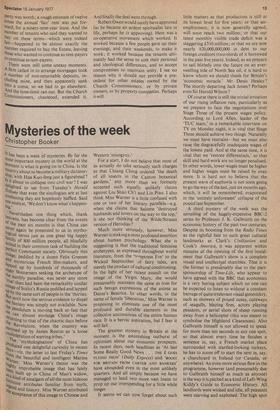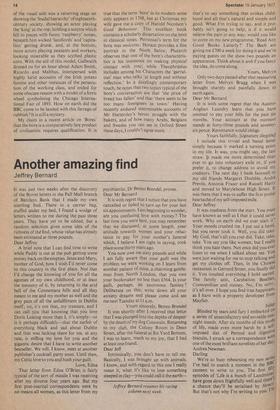Mysteries of the week
Christopher Booker it has been a week Of mysteries. By far the Most important mystery in the world at the ni°ment is what is going on in China. Is the Country about to become a military dictator with Hua Kuo-feng just a figurehead ? Is it about to collapse into civil war? I was d...efighted to see from Tuesday's Herald iribune that even the sinologists are at last confessing they are hopelessly baffled. Said °. ne analyst, 'We don't know what's happening., Nevertheless one thing which, thank 'leavens, has become clear from the events °f the past six months is that China can !lever again be presented to us in mythoifOgical terms just as one great big happy arnIlY of 800 million people, all blissfully united in their common task of building the perfect Communist society. Obviously this 11-ilage, peddled by a dozen Felix Greenes Trici mysterious French film-makers, and aPPed up by hundreds of thousands of !Lager Westerners seeking the archetype of ,gle earthly paradise, was never any more ittue than had been the remarkably similar ulage of Stalin's Russia peddled and lapped 1413 bY the same sort of people in the 'thirties. that until now the serious evidence to dispel he fantasy was simply not available. Now Pendulum is moving back so fast that rwe can almost envisage China's image tet,turning to that of the chaotic days before s"e Revolution, when the country was ,stannled up by James Reston as 'a loose 'Onfederation of warring tribes.' The 'mythologisation' of China has 'dtoduced one delightful curiosity in recent fraYs—viz. the letter' to last Friday's Times the beautiful and intelligent Marina a,./.11, et% Miss Warner's theme was the "1Y improbable image that has lately as built up in China of Mao's widow, akind of amalgam of all the most hideous 1.111MI0e attributes familiar from myth, the and history. Miss Warner attributed e acceptance of this image to Chinese and
Western 'misogyny.'
For a start, I do not believe that most of us actually do take seriously such charges as that Chiang Ching ordered 'the death of all insects in the Canton botanical gardens,' any more than we formerly accepted such equally unlikely claims against Liu Shao Ch'i and Lin Piao. I also think Miss Warner is a little confused with one or two of her literary parallels—e.g. when she claims that Salome 'destroyed husbands and lovers on the way to the top,' is she not thinking of the Wilde/Strauss version of Herodias ?
Much more seriously, however, Miss Warner is making a most profound assertion about human psychology. What she is suggesting is that the traditional feminine archetypes, as expressed throughout world literature, from the 'temptress Eve' to the Wicked Stepmother of fairy tales, are merely the product of cultural conditioning. In the light of her recent assault on the image of the Virgin Mary, she would presumably maintain the same as true for such benign expressions of 'the anima as Dante's Beatrice. In other words, in the name of female 'liberation,' Miss Warner is proposing to eliminate one of the most profound and durable elements in the collective unconscious of the entire human race. It is a heroic aspiration, but I fear it will fail.
The greatest mystery in Britain at the moment is the astonishing outburst of optimism about our economic prospects. In recent days, such headlines as 'At last Some Really Good News . . . THE GOES FLYING HIGH' (Daily Express) and 'BOOST FOR BRITAIN FROM CARTER AND BANKERS' have abounded even in the most unlikely quarters. And all simply because we have managed to land two more vast loans to prop up our overspending for a little while longer.
It seems we can now forget about such
little Matters as that production is still at its lowest level for five years; or that unemployment, it is now generally agreed, will soon reach two million; or that our latest monthly visible trade deficit was a staggering £510 million; or that we are now nearly 820,000,000,000 in debt . to our foreign creditors (two-thirds of it borrowed in the past five years). Indeed, as we prepare to sail blithely into the future on an everswelling tide of North Sea oil, it is hard to know whom we should thank for Britain's 'economic miracle.' Mr Denis Healey ? The shortly departing Jack Jones? Perhaps even Sir Harold Wilson ?
Of course there is still the trivial irritation of our rising inflation rate, particularly as we prepare to face the negotiations over Stage Three of the present wages policy. According to Lord Allen, leader of the 'TUC team,' in a remarkable interview on TV on Monday night, it is vital that Stage Three should achieve two things. Naturally we must have restraint—but we must also raise the disgracefully inadequate wages of the lowest paid. And at the same time, it is vital that we 'restore differentials,' so that skill and hard work are no longer penalised. In other words, lower wages must be higher and higher wages must be raised by even more. It is hard not to believe that the present wave of euphoria is not soon going to go the way of the last, just six months ago, which, it will be remembered, evaporated in the 'entirely unforeseen' collapse of the pound last September.
A third mystery of the week was the unveiling of the hugely-expensive BBC-2 series by Professor J. K. Galbraith on the economic history of the past two centuries. Despite its boosting from the Radio Times as the rightful heir to such great cultural landmarks as Clark's Civilisation and Cook's America, it was apparent within minutes of the opening of the first instalment that Galbraith's show is a complete visual and intellectual shambles. That it is the former is prestimably due to the partsponsorship of Time-Life, who appear to have agreed with the BBC that economics is a very boring subject which no one can be expected to listen to without a constant barrage of quite irrelevant visual gimmickry, such as showers of pound notes, cutaways of seagulls, blazing fires, actors playing peasants, or aerial shots of sheep running away from a helicopter (this was meant to symbolise the Highland Clearances). Also Galbraith himself is not allowed to speak for more than ten seconds in any one spot, so that almost every time he finishes a sentence in, say, a French market place surrounded with startled-looking turkeys, he has to zoom off to start the next in, say, a churchyard in Ireland (or Canada, or anywhere). An even more serious flaw in the programme, however (and presumably due to Galbraith himself as much as anyone) is the way it is pitched as a kind of Left-Wing Kiddy's Guide to Economic History. All landlords were wicked and idle, all peasants were starving and exploited. The high spot of the visual aids was a recurring stage set showing the 'feudal hierarchy' of eighteenthcentury society, showing an actor playing the 'king' at the top, holding a sceptre which fell to pieces with funny 'raspberry' noises, beneath him wicked 'landlords' and 'capitalists' getting drunk, and, at the bottom, more actors playing peasants and workers, looking miserable as they scythed plastic corn. With the aid of this model, Galbraith droned on for an hour about Adam Smith, Ricardo and Malthus, interspersed with highly lurid accounts of the Irish potato famine and other instances of the persecution of the working class, and ended for some obscure reason with a model of a ferris wheel symbolising the Chicago International Fair of 1893. How on earth did the BBC come to be landed with this farrago of rubbish ? It is still a mystery.
My claim in a recent article on 'Bores' that the bore is a comparatively late product of civilisation requires qualification. It is
true that the term 'bore' in its modern sense only appears in 1768, but at Christmas my wife gave me a copy of Harold Nicolson's Good Behaviour. This excellent book contains a scholarly dissertation on the bore in classical times. Petronius's term for the bore was molestus; Horace provides a fine portrait in the Ninth Satire; Plutarch observes that one of the bore's characteristics is his insistence on making physical contact with you; while Theophrastus includes among his Characters the 'garrulous' man who talks `at length and without reflection.' In a dazzlingly contemporary touch, he notes that two topics typical of the bore's conversation are that `the price of bread has fallen' and that 'there seem to be too many foreigners in town.' Having recently endured interminable accounts of Mr Hattersley's heroic struggle with the bakers, and of how many Arabs, Belgians and Swedes you can see in Oxford Street these days, I couldn't agree more.



































 Previous page
Previous page